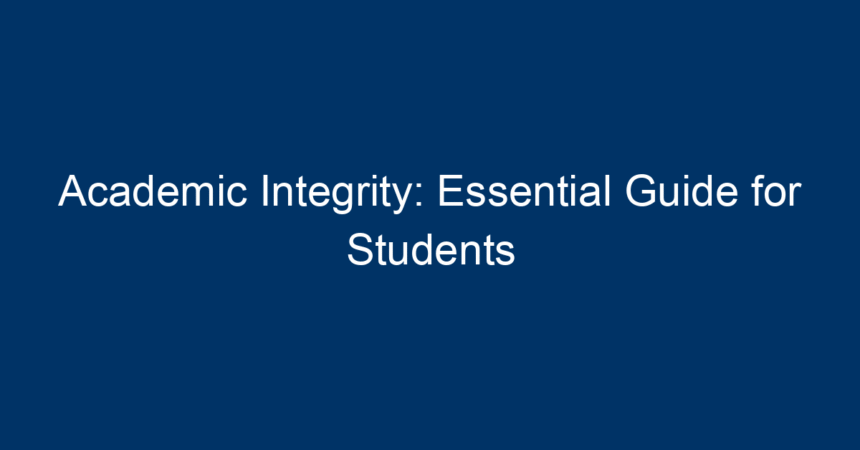In the academic world, integrity is more than just a buzzword; it’s the foundation upon which the credibility of educational institutions rests. Academic integrity means adhering to ethical principles and standards in academic work, and it is crucial for maintaining trust between students, educators, and the broader academic community. In this comprehensive guide, we will delve into what academic integrity is, why it’s important, common violations, and how students can uphold it in their studies.
What is Academic Integrity?
Academic integrity refers to the commitment to honesty, trust, fairness, respect, and responsibility in the academic environment. It ensures that all students can work towards their educational goals honestly and fosters an environment where learning can thrive without fear of dishonesty. Upholding academic integrity means that you are committed to being truthful in your academic endeavors, giving credit where it’s due, and refraining from fraudulent behaviors.
The Core Principles of Academic Integrity
The principles of academic integrity can typically be divided into five key areas:
-
Honesty: This means acknowledging the contributions of others and disclosing any assistance received in the completion of academic work.
-
Trust: Building trust among faculty and peers creates a safe learning environment where individuals feel free to express their ideas.
-
Fairness: Equal treatment is vital in academic settings. This means ensuring that everyone has the same opportunities to succeed.
-
Respect: Valuing each other’s ideas and contributions helps cultivate a culture of inclusivity.
- Responsibility: Each student is responsible for adhering to these principles and holding themselves accountable for their actions.
Why is Academic Integrity Important?
Understanding the importance of academic integrity is essential for students. The implications of dishonest practices can be far-reaching, affecting not just the individual but the entire academic community.
1. Builds Reputation and Credibility
When students demonstrate academic integrity, they build their reputation as trustworthy individuals. This credibility can be crucial when seeking internships, employment opportunities, or further education. Employers often look for candidates who are known for their ethical standards.
2. Enhances Learning Experience
Adhering to academic integrity ensures that your learning experience is genuine. When you engage fully in your studies, you develop critical thinking skills, a deeper understanding of the subject matter, and a passion for learning that goes beyond grades.
3. Fosters Positive Academic Environment
A commitment to academic integrity promotes a positive environment in educational institutions. When students and faculty alike adhere to ethical standards, the learning environment becomes more collaborative and respectful.
4. Prevention of Plagiarism and Other Violations
Understanding and embracing academic integrity helps prevent violations like plagiarism and cheating. Knowledge of these concepts enables students to navigate their studies more effectively and ethically.
Common Violations of Academic Integrity
Even with the best intentions, students might unintentionally violate academic integrity. Here are some common pitfalls to avoid:
1. Plagiarism
Plagiarism occurs when students present someone else’s work or ideas as their own without proper attribution. This can include copying text, images, or even ideas from books, articles, or online sources. Educational institutions take plagiarism seriously, often leading to severe penalties, including expulsion.
2. Cheating
Cheating can take many forms, including copying answers during exams, using unauthorized resources, or submitting work that is not your own. This not only undermines your education but also the integrity of your institution.
3. Fabrication
Fabrication involves falsifying data or information in your academic work. This could include inventing sources for research, manipulating experimental data, or providing false information in applications.
4. Collusion
Collusion occurs when students collaborate on assignments without permission. While group work can be valuable, it is essential to respect the rules established by your instructor regarding collaboration.
How to Uphold Academic Integrity
To maintain academic integrity, students should adopt several best practices in their academic work:
1. Understand Your Institution’s Policies
Familiarize yourself with your school’s academic integrity policies. Each institution will have its own set of rules and consequences for violations, so understanding these guidelines is essential.
2. Properly Cite Sources
Whenever you use someone else’s ideas or work, ensure you cite your sources appropriately. Familiarize yourself with different citation styles (APA, MLA, Chicago, etc.) and use them correctly in your assignments.
3. Develop Effective Study Habits
Good study habits can help mitigate the temptation to cheat or plagiarize. Break your work into smaller tasks, create a schedule, and engage fully with the material. This will not only improve your learning experience but also reduce stress during deadlines.
4. Utilize Available Resources
Take advantage of resources like writing centers, libraries, and academic advising services. Many institutions offer workshops focused on academic integrity, writing skills, and research methods that can bolster your ability to complete assignments ethically.
5. Seek Help When Needed
If you’re struggling with a subject or assignment, don’t hesitate to ask for help from peers or instructors. Explaining your concerns can lead to constructive solutions rather than resorting to dishonest practices.
6. Cultivate a Supportive Academic Network
Surround yourself with peers who value academic integrity. A supportive network can encourage ethical behavior and provide motivation to excel honestly.
Conclusion: Embracing Academic Integrity for Lifelong Success
In summary, academic integrity is not just a requirement for success in education; it is a core human value that lasts throughout one’s life. By understanding the principles of academic integrity and committing to them, students set themselves up for a successful and fulfilling academic journey.
Adopting these practices, being aware of the importance of ethical behavior, and maintaining honesty in your academic efforts are essential steps to personal and professional growth. Remember, cultivating integrity today will pave the way for a brighter and more honest future. Embrace these principles, and you will not only achieve academic success but also build a reputation of character and trustworthiness that will serve you throughout your life.




